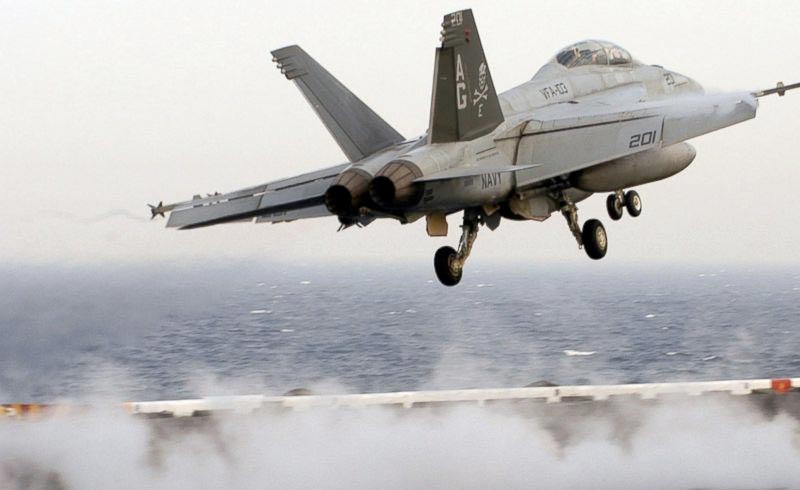 An F/A-18F Super Hornet launches from the flight deck. Image Travis Alston/U.S. Navy/Getty Images
An F/A-18F Super Hornet launches from the flight deck. Image Travis Alston/U.S. Navy/Getty Images
Far from weakening the Islamic State there is evidence that US led airstrikes are actually having the reverse effect argues Elliot Murphy
As the British government launches its seventh anti-terrorism bill since the new millennium, which includes measures to require internet providers to share users’ identities with the state, the cyber war at home against ‘potential extremists’ is fought alongside the continued drone raids in the Middle East against a different class of targets – Syrian and Iraqi citizens.
A recent report from Secretary-General of the UN, Ban Ki-moon, revealed that the US-UK strikes on Islamic State (IS) in Syria have killed 865 people since late September, 50 of which being civilians, including eight children and five women. Human Rights Watch has claimed that, according to three residents and judging by the remnants of Tomahawk cruise missiles, strikes on the Syrian village of Kafr Deryan killed at least two men, two women and five children on the morning of September 23rd.
After Pentagon Press Secretary Rear Admiral John Kirby confessed that he was ‘cognizant’ that US strikes on IS may lead to unintended casualties, retired US Army Colonel Douglas MacGregor told RT that the strikes are in fact ‘helping the Sunni Islamists recruit new people – more than a thousand every month from across Asia, Africa, and the Middle East’.
On November 27th, the Syrian Observatory for Human Rights (SOHR) reported that raids on the city of al-Raqqa killed eight civilians, including a child and three women, with IS conflicts with the Syrian regime intensifying since the US-UK bombing raids began in September. SOHR is also aware that at least 73 people joined IS in Aleppo soon after the first US-led strikes.
The terror threats dramatically constructed by Theresa May are especially good for business, with David Cameron announcing recently £130 million in assistance to their just cause. BAE-Systems are profiting handsomely from the current campaign. In the US, writes Robert Fisk, ‘every increase in profits for Lockheed Martin, Raytheon, Northrop Grumman and General Dynamics is creating yet more Isis fighters’.
As Mark Curtis has detailed in a series of compelling books on post-war foreign policy, the potential for ‘blowback’ from such new recruits is indeed real, and intensifying. But as Curtis also notes, the vast majority of terror attacks over the last decade have come from Ireland, not Iraq or Syria.
We are long past the point at which the economic, moral and ideological justification of the ‘war on terror’ can even be acknowledged as a serious argument. Iraq, Afghanistan and Libya all point to what Curtis would call the ‘web of deceit’ surrounding the artificial notion of ‘national security’ and other proclaimed priorities, dutifully regurgitated by substantial elements of the media.
Indeed, it was recently revealed by the Guardian that US drone strikes in Syria are provoking anti-Assad groups into joining IS. More ominously, civilian support for the jihadists appears to be growing in response to US-UK violence.
Informants claim that Isis is gaining support due to its carrying out of social reforms and its establishment of military security. Drone strikes against ‘IS supporters’ will only yield more violence. IS has no military bases to bomb, no monuments to symbolically vandalise and demolish, and is engaged in separate conflicts with various jihadi groups in Syria and Iraq.
Cameron’s support for Obama’s drone strikes can be seen as a manifestation of what a Foreign & Commonwealth Office draft paper called in August 1968 the fear of Britain ‘becoming increasingly peripheral to US concerns’. The US ‘feels the need for friends and Britain is probably the best friend they have … We are still the best Boswell to the US Johnson’.
After suffering a humiliating defeat in the Commons last summer during the vote on Syrian intervention, the Tories’ imperialist elements have their eyes set on further western domination of Middle East oil resources and the region’s strategic value. Many of the weapons the west are supplying to the Syrian rebels are also falling into the hands of IS. Curtailing these and other forms of support for IS (financial, educational, etc.) means voicing opposition to the Saudi regime – a major source of funding and educational support for IS – which certain key elements of the British financial sector are beholden to.
And while prominent figures like Sam Harris and Bill Maher denounce the alleged wickedness of Islam, they continue to live in nations which inflict far more violence and encourage greater levels of hatred than any other institutions or religious groups. The same could be said of the esteemed philosopher John Gray, who in a melodramatic piece for the Guardian entitled ‘The evil within’ (21/10/14) deemed non-intervention to be ‘a morally compromised option’, believing that ‘military action may be justified’ if there are ‘sufficient resources’ to carry out such a campaign.
British support for US state violence is so commonplace now that it is becoming increasingly easier to sit back and let it happen. Though it may be harder in 2014 to find arenas of public debate and protest to engage with than in 2003, that is hardly an argument for disengagement. Countering these imperialistic urges is vital if the violence is to end, as anti-war groups across the country understand. Britain is still the best Boswell to the US Johnson, and it will continue to be as long as we allow it.

